Business Ethics: The Sackler Family, Museums, and Public Perception
VerifiedAdded on 2023/01/19
|14
|2691
|68
Report
AI Summary
This report presents a case study of the Sackler family's donations to museums and galleries, examining the ethical implications of their philanthropic activities in light of their involvement in the production of addictive painkillers. The analysis explores the impact of these donations on the reputation of cultural institutions, public perception, and the quality of services offered. It investigates how unethical practices affect the success of these organizations, considering both financial and reputational aspects. The report also evaluates the need for effective regulations for organizations receiving donations and how unethical behavior can affect them. The conclusion emphasizes the importance of integrating ethical considerations into all business practices, especially for public and non-profit organizations, and provides recommendations for ethical conduct. The report highlights the importance of transparency and due diligence in accepting donations to maintain public trust and avoid controversies.
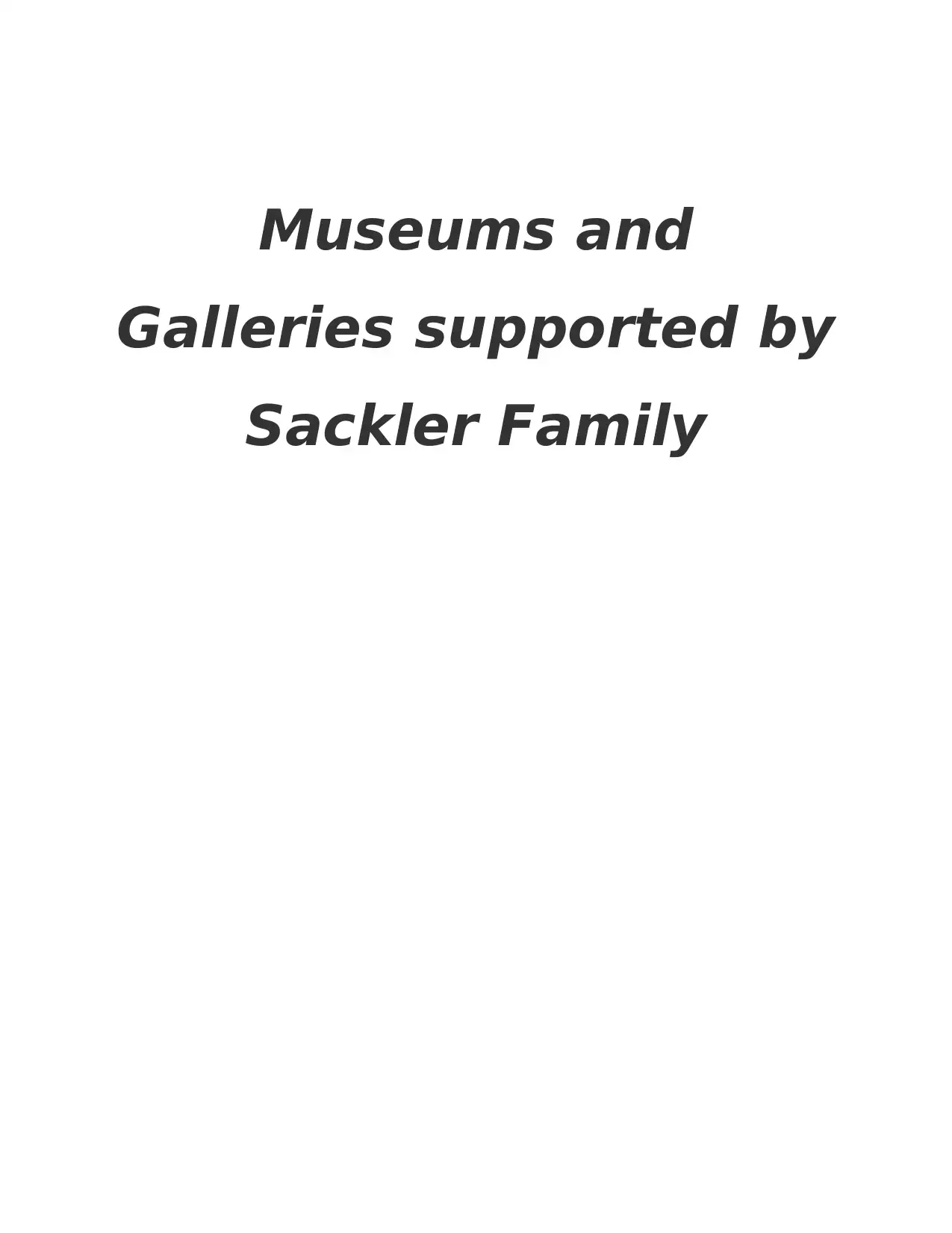
Museums and
Galleries supported by
Sackler Family
Galleries supported by
Sackler Family
Paraphrase This Document
Need a fresh take? Get an instant paraphrase of this document with our AI Paraphraser
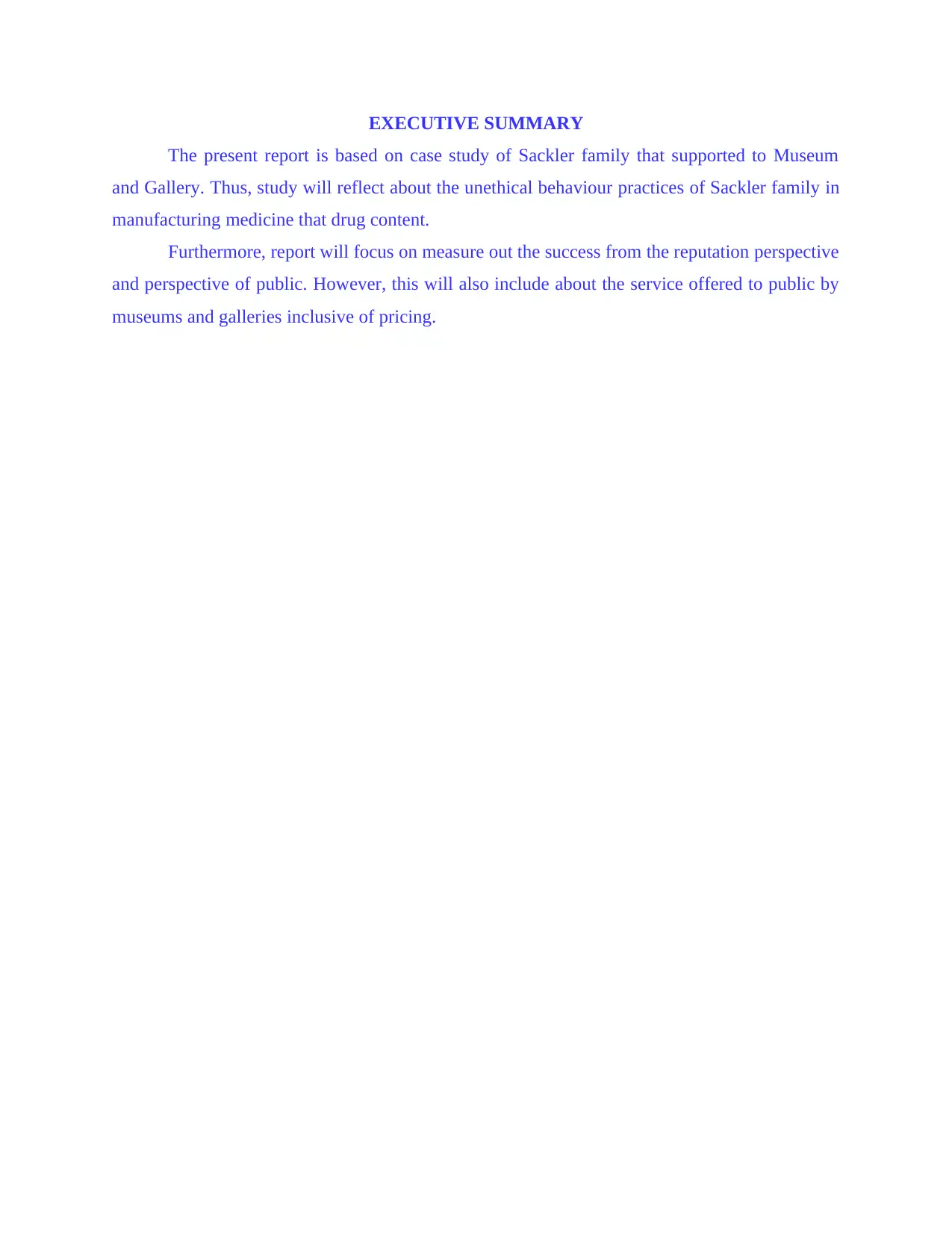
EXECUTIVE SUMMARY
The present report is based on case study of Sackler family that supported to Museum
and Gallery. Thus, study will reflect about the unethical behaviour practices of Sackler family in
manufacturing medicine that drug content.
Furthermore, report will focus on measure out the success from the reputation perspective
and perspective of public. However, this will also include about the service offered to public by
museums and galleries inclusive of pricing.
The present report is based on case study of Sackler family that supported to Museum
and Gallery. Thus, study will reflect about the unethical behaviour practices of Sackler family in
manufacturing medicine that drug content.
Furthermore, report will focus on measure out the success from the reputation perspective
and perspective of public. However, this will also include about the service offered to public by
museums and galleries inclusive of pricing.
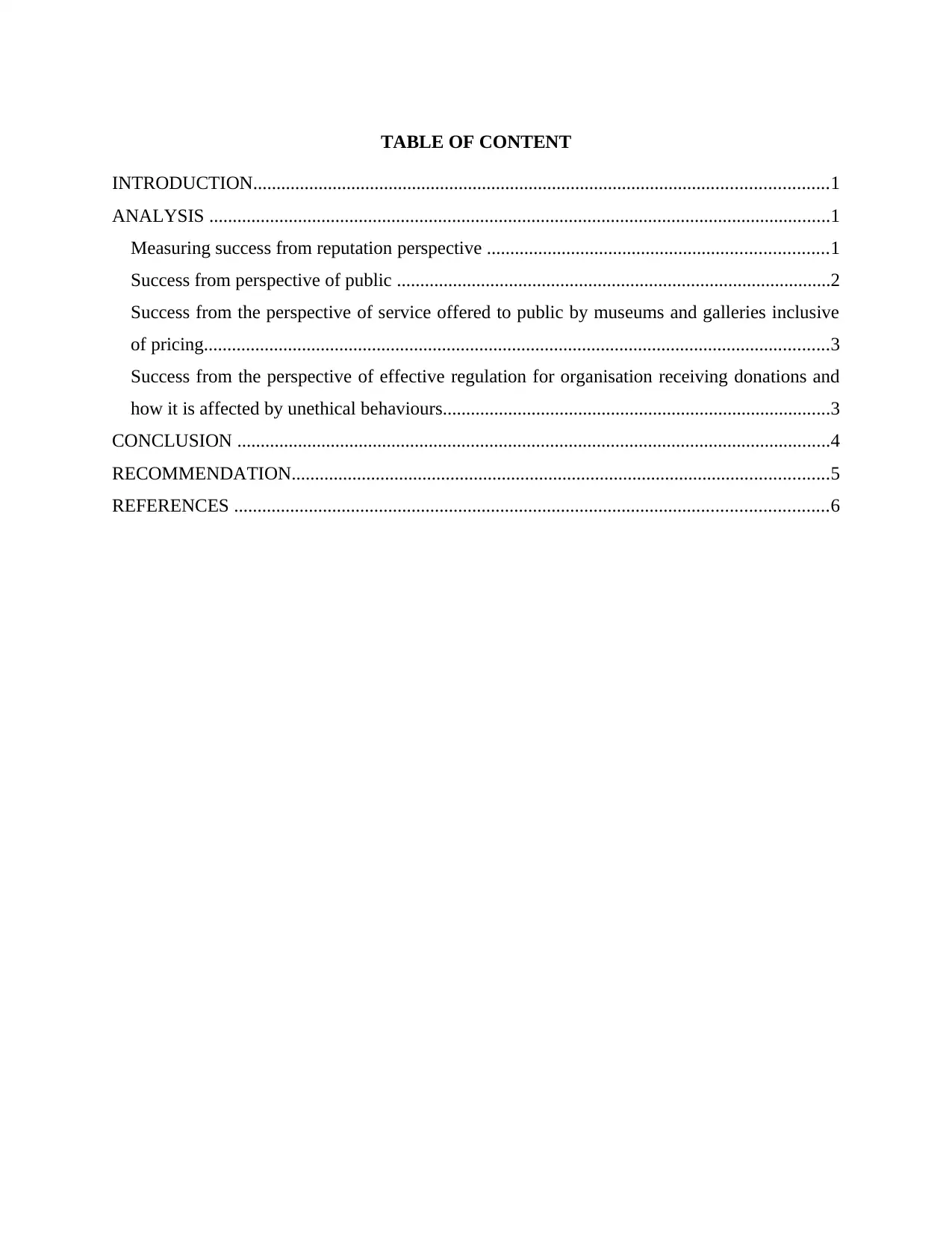
TABLE OF CONTENT
INTRODUCTION...........................................................................................................................1
ANALYSIS .....................................................................................................................................1
Measuring success from reputation perspective .........................................................................1
Success from perspective of public .............................................................................................2
Success from the perspective of service offered to public by museums and galleries inclusive
of pricing......................................................................................................................................3
Success from the perspective of effective regulation for organisation receiving donations and
how it is affected by unethical behaviours...................................................................................3
CONCLUSION ...............................................................................................................................4
RECOMMENDATION...................................................................................................................5
REFERENCES ...............................................................................................................................6
INTRODUCTION...........................................................................................................................1
ANALYSIS .....................................................................................................................................1
Measuring success from reputation perspective .........................................................................1
Success from perspective of public .............................................................................................2
Success from the perspective of service offered to public by museums and galleries inclusive
of pricing......................................................................................................................................3
Success from the perspective of effective regulation for organisation receiving donations and
how it is affected by unethical behaviours...................................................................................3
CONCLUSION ...............................................................................................................................4
RECOMMENDATION...................................................................................................................5
REFERENCES ...............................................................................................................................6
⊘ This is a preview!⊘
Do you want full access?
Subscribe today to unlock all pages.

Trusted by 1+ million students worldwide
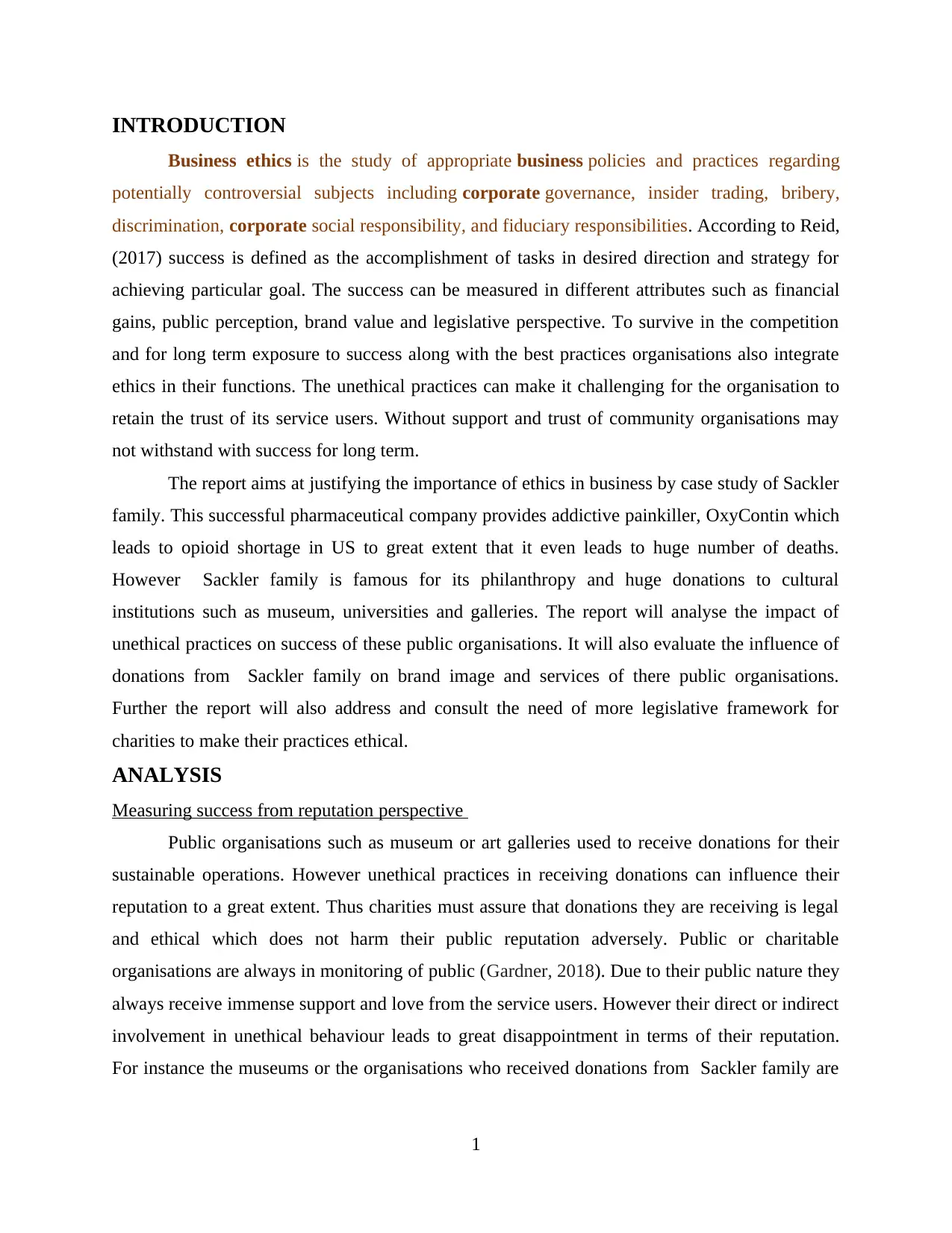
INTRODUCTION
Business ethics is the study of appropriate business policies and practices regarding
potentially controversial subjects including corporate governance, insider trading, bribery,
discrimination, corporate social responsibility, and fiduciary responsibilities. According to Reid,
(2017) success is defined as the accomplishment of tasks in desired direction and strategy for
achieving particular goal. The success can be measured in different attributes such as financial
gains, public perception, brand value and legislative perspective. To survive in the competition
and for long term exposure to success along with the best practices organisations also integrate
ethics in their functions. The unethical practices can make it challenging for the organisation to
retain the trust of its service users. Without support and trust of community organisations may
not withstand with success for long term.
The report aims at justifying the importance of ethics in business by case study of Sackler
family. This successful pharmaceutical company provides addictive painkiller, OxyContin which
leads to opioid shortage in US to great extent that it even leads to huge number of deaths.
However Sackler family is famous for its philanthropy and huge donations to cultural
institutions such as museum, universities and galleries. The report will analyse the impact of
unethical practices on success of these public organisations. It will also evaluate the influence of
donations from Sackler family on brand image and services of there public organisations.
Further the report will also address and consult the need of more legislative framework for
charities to make their practices ethical.
ANALYSIS
Measuring success from reputation perspective
Public organisations such as museum or art galleries used to receive donations for their
sustainable operations. However unethical practices in receiving donations can influence their
reputation to a great extent. Thus charities must assure that donations they are receiving is legal
and ethical which does not harm their public reputation adversely. Public or charitable
organisations are always in monitoring of public (Gardner, 2018). Due to their public nature they
always receive immense support and love from the service users. However their direct or indirect
involvement in unethical behaviour leads to great disappointment in terms of their reputation.
For instance the museums or the organisations who received donations from Sackler family are
1
Business ethics is the study of appropriate business policies and practices regarding
potentially controversial subjects including corporate governance, insider trading, bribery,
discrimination, corporate social responsibility, and fiduciary responsibilities. According to Reid,
(2017) success is defined as the accomplishment of tasks in desired direction and strategy for
achieving particular goal. The success can be measured in different attributes such as financial
gains, public perception, brand value and legislative perspective. To survive in the competition
and for long term exposure to success along with the best practices organisations also integrate
ethics in their functions. The unethical practices can make it challenging for the organisation to
retain the trust of its service users. Without support and trust of community organisations may
not withstand with success for long term.
The report aims at justifying the importance of ethics in business by case study of Sackler
family. This successful pharmaceutical company provides addictive painkiller, OxyContin which
leads to opioid shortage in US to great extent that it even leads to huge number of deaths.
However Sackler family is famous for its philanthropy and huge donations to cultural
institutions such as museum, universities and galleries. The report will analyse the impact of
unethical practices on success of these public organisations. It will also evaluate the influence of
donations from Sackler family on brand image and services of there public organisations.
Further the report will also address and consult the need of more legislative framework for
charities to make their practices ethical.
ANALYSIS
Measuring success from reputation perspective
Public organisations such as museum or art galleries used to receive donations for their
sustainable operations. However unethical practices in receiving donations can influence their
reputation to a great extent. Thus charities must assure that donations they are receiving is legal
and ethical which does not harm their public reputation adversely. Public or charitable
organisations are always in monitoring of public (Gardner, 2018). Due to their public nature they
always receive immense support and love from the service users. However their direct or indirect
involvement in unethical behaviour leads to great disappointment in terms of their reputation.
For instance the museums or the organisations who received donations from Sackler family are
1
Paraphrase This Document
Need a fresh take? Get an instant paraphrase of this document with our AI Paraphraser
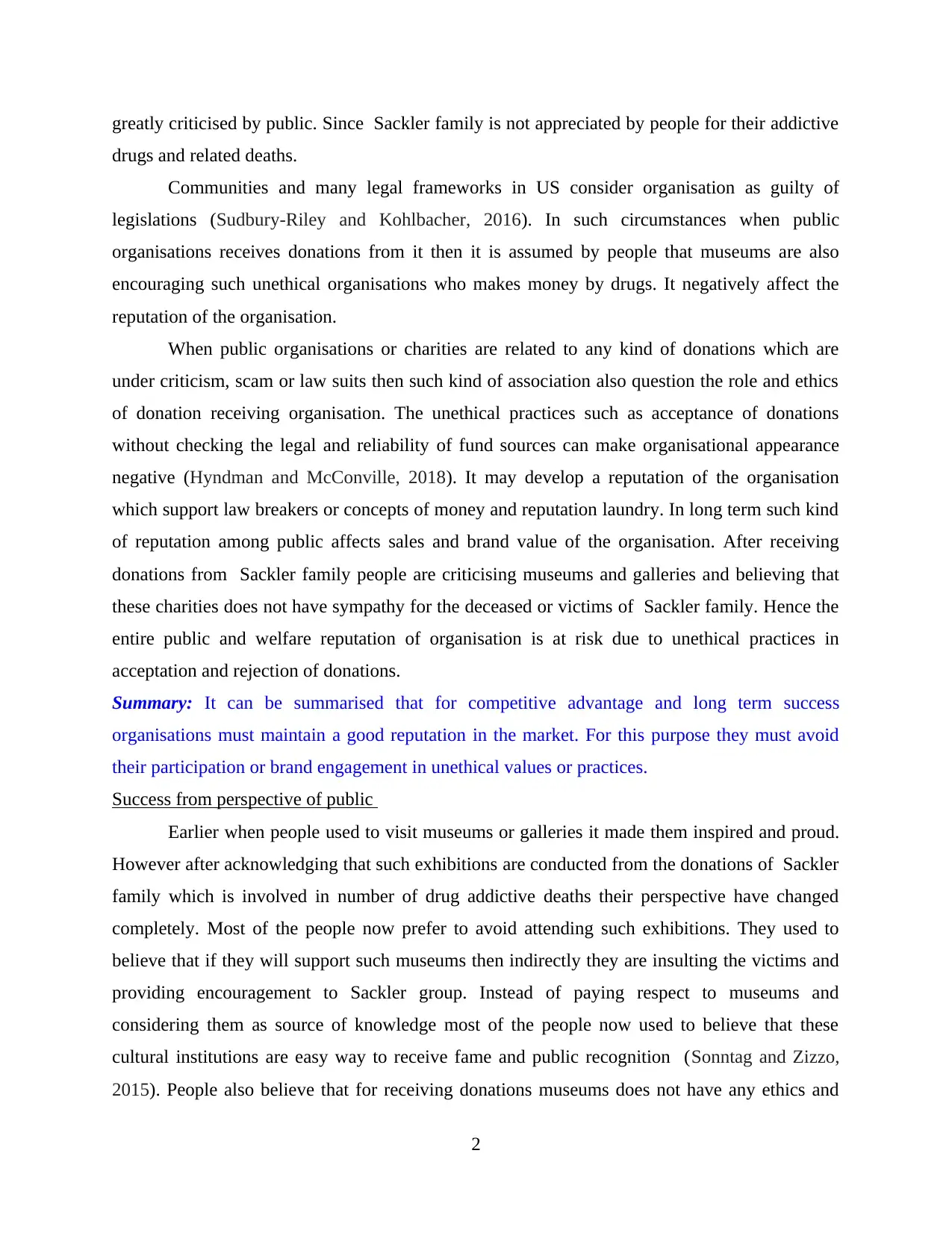
greatly criticised by public. Since Sackler family is not appreciated by people for their addictive
drugs and related deaths.
Communities and many legal frameworks in US consider organisation as guilty of
legislations (Sudbury-Riley and Kohlbacher, 2016). In such circumstances when public
organisations receives donations from it then it is assumed by people that museums are also
encouraging such unethical organisations who makes money by drugs. It negatively affect the
reputation of the organisation.
When public organisations or charities are related to any kind of donations which are
under criticism, scam or law suits then such kind of association also question the role and ethics
of donation receiving organisation. The unethical practices such as acceptance of donations
without checking the legal and reliability of fund sources can make organisational appearance
negative (Hyndman and McConville, 2018). It may develop a reputation of the organisation
which support law breakers or concepts of money and reputation laundry. In long term such kind
of reputation among public affects sales and brand value of the organisation. After receiving
donations from Sackler family people are criticising museums and galleries and believing that
these charities does not have sympathy for the deceased or victims of Sackler family. Hence the
entire public and welfare reputation of organisation is at risk due to unethical practices in
acceptation and rejection of donations.
Summary: It can be summarised that for competitive advantage and long term success
organisations must maintain a good reputation in the market. For this purpose they must avoid
their participation or brand engagement in unethical values or practices.
Success from perspective of public
Earlier when people used to visit museums or galleries it made them inspired and proud.
However after acknowledging that such exhibitions are conducted from the donations of Sackler
family which is involved in number of drug addictive deaths their perspective have changed
completely. Most of the people now prefer to avoid attending such exhibitions. They used to
believe that if they will support such museums then indirectly they are insulting the victims and
providing encouragement to Sackler group. Instead of paying respect to museums and
considering them as source of knowledge most of the people now used to believe that these
cultural institutions are easy way to receive fame and public recognition (Sonntag and Zizzo,
2015). People also believe that for receiving donations museums does not have any ethics and
2
drugs and related deaths.
Communities and many legal frameworks in US consider organisation as guilty of
legislations (Sudbury-Riley and Kohlbacher, 2016). In such circumstances when public
organisations receives donations from it then it is assumed by people that museums are also
encouraging such unethical organisations who makes money by drugs. It negatively affect the
reputation of the organisation.
When public organisations or charities are related to any kind of donations which are
under criticism, scam or law suits then such kind of association also question the role and ethics
of donation receiving organisation. The unethical practices such as acceptance of donations
without checking the legal and reliability of fund sources can make organisational appearance
negative (Hyndman and McConville, 2018). It may develop a reputation of the organisation
which support law breakers or concepts of money and reputation laundry. In long term such kind
of reputation among public affects sales and brand value of the organisation. After receiving
donations from Sackler family people are criticising museums and galleries and believing that
these charities does not have sympathy for the deceased or victims of Sackler family. Hence the
entire public and welfare reputation of organisation is at risk due to unethical practices in
acceptation and rejection of donations.
Summary: It can be summarised that for competitive advantage and long term success
organisations must maintain a good reputation in the market. For this purpose they must avoid
their participation or brand engagement in unethical values or practices.
Success from perspective of public
Earlier when people used to visit museums or galleries it made them inspired and proud.
However after acknowledging that such exhibitions are conducted from the donations of Sackler
family which is involved in number of drug addictive deaths their perspective have changed
completely. Most of the people now prefer to avoid attending such exhibitions. They used to
believe that if they will support such museums then indirectly they are insulting the victims and
providing encouragement to Sackler group. Instead of paying respect to museums and
considering them as source of knowledge most of the people now used to believe that these
cultural institutions are easy way to receive fame and public recognition (Sonntag and Zizzo,
2015). People also believe that for receiving donations museums does not have any ethics and
2
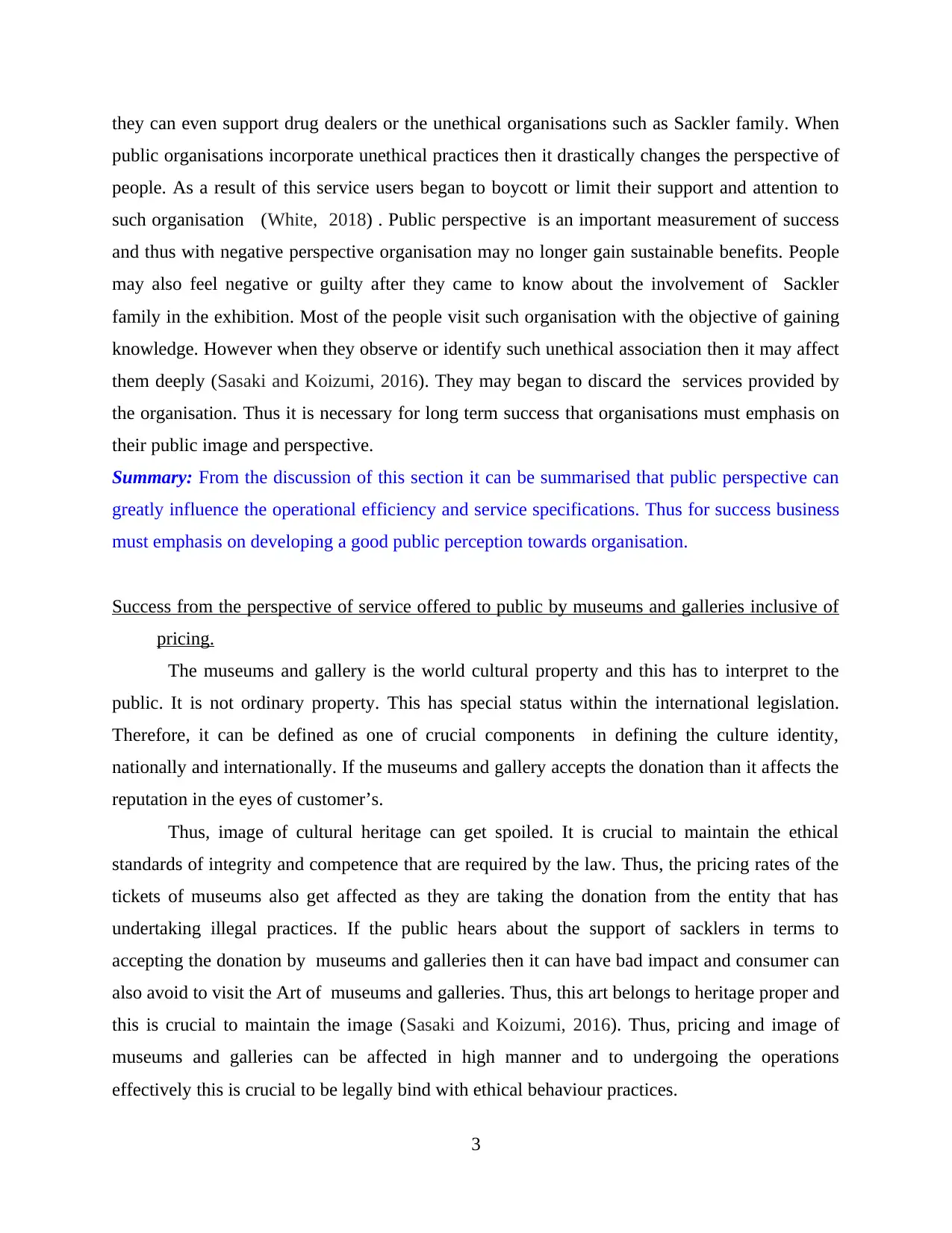
they can even support drug dealers or the unethical organisations such as Sackler family. When
public organisations incorporate unethical practices then it drastically changes the perspective of
people. As a result of this service users began to boycott or limit their support and attention to
such organisation (White, 2018) . Public perspective is an important measurement of success
and thus with negative perspective organisation may no longer gain sustainable benefits. People
may also feel negative or guilty after they came to know about the involvement of Sackler
family in the exhibition. Most of the people visit such organisation with the objective of gaining
knowledge. However when they observe or identify such unethical association then it may affect
them deeply (Sasaki and Koizumi, 2016). They may began to discard the services provided by
the organisation. Thus it is necessary for long term success that organisations must emphasis on
their public image and perspective.
Summary: From the discussion of this section it can be summarised that public perspective can
greatly influence the operational efficiency and service specifications. Thus for success business
must emphasis on developing a good public perception towards organisation.
Success from the perspective of service offered to public by museums and galleries inclusive of
pricing.
The museums and gallery is the world cultural property and this has to interpret to the
public. It is not ordinary property. This has special status within the international legislation.
Therefore, it can be defined as one of crucial components in defining the culture identity,
nationally and internationally. If the museums and gallery accepts the donation than it affects the
reputation in the eyes of customer’s.
Thus, image of cultural heritage can get spoiled. It is crucial to maintain the ethical
standards of integrity and competence that are required by the law. Thus, the pricing rates of the
tickets of museums also get affected as they are taking the donation from the entity that has
undertaking illegal practices. If the public hears about the support of sacklers in terms to
accepting the donation by museums and galleries then it can have bad impact and consumer can
also avoid to visit the Art of museums and galleries. Thus, this art belongs to heritage proper and
this is crucial to maintain the image (Sasaki and Koizumi, 2016). Thus, pricing and image of
museums and galleries can be affected in high manner and to undergoing the operations
effectively this is crucial to be legally bind with ethical behaviour practices.
3
public organisations incorporate unethical practices then it drastically changes the perspective of
people. As a result of this service users began to boycott or limit their support and attention to
such organisation (White, 2018) . Public perspective is an important measurement of success
and thus with negative perspective organisation may no longer gain sustainable benefits. People
may also feel negative or guilty after they came to know about the involvement of Sackler
family in the exhibition. Most of the people visit such organisation with the objective of gaining
knowledge. However when they observe or identify such unethical association then it may affect
them deeply (Sasaki and Koizumi, 2016). They may began to discard the services provided by
the organisation. Thus it is necessary for long term success that organisations must emphasis on
their public image and perspective.
Summary: From the discussion of this section it can be summarised that public perspective can
greatly influence the operational efficiency and service specifications. Thus for success business
must emphasis on developing a good public perception towards organisation.
Success from the perspective of service offered to public by museums and galleries inclusive of
pricing.
The museums and gallery is the world cultural property and this has to interpret to the
public. It is not ordinary property. This has special status within the international legislation.
Therefore, it can be defined as one of crucial components in defining the culture identity,
nationally and internationally. If the museums and gallery accepts the donation than it affects the
reputation in the eyes of customer’s.
Thus, image of cultural heritage can get spoiled. It is crucial to maintain the ethical
standards of integrity and competence that are required by the law. Thus, the pricing rates of the
tickets of museums also get affected as they are taking the donation from the entity that has
undertaking illegal practices. If the public hears about the support of sacklers in terms to
accepting the donation by museums and galleries then it can have bad impact and consumer can
also avoid to visit the Art of museums and galleries. Thus, this art belongs to heritage proper and
this is crucial to maintain the image (Sasaki and Koizumi, 2016). Thus, pricing and image of
museums and galleries can be affected in high manner and to undergoing the operations
effectively this is crucial to be legally bind with ethical behaviour practices.
3
⊘ This is a preview!⊘
Do you want full access?
Subscribe today to unlock all pages.

Trusted by 1+ million students worldwide
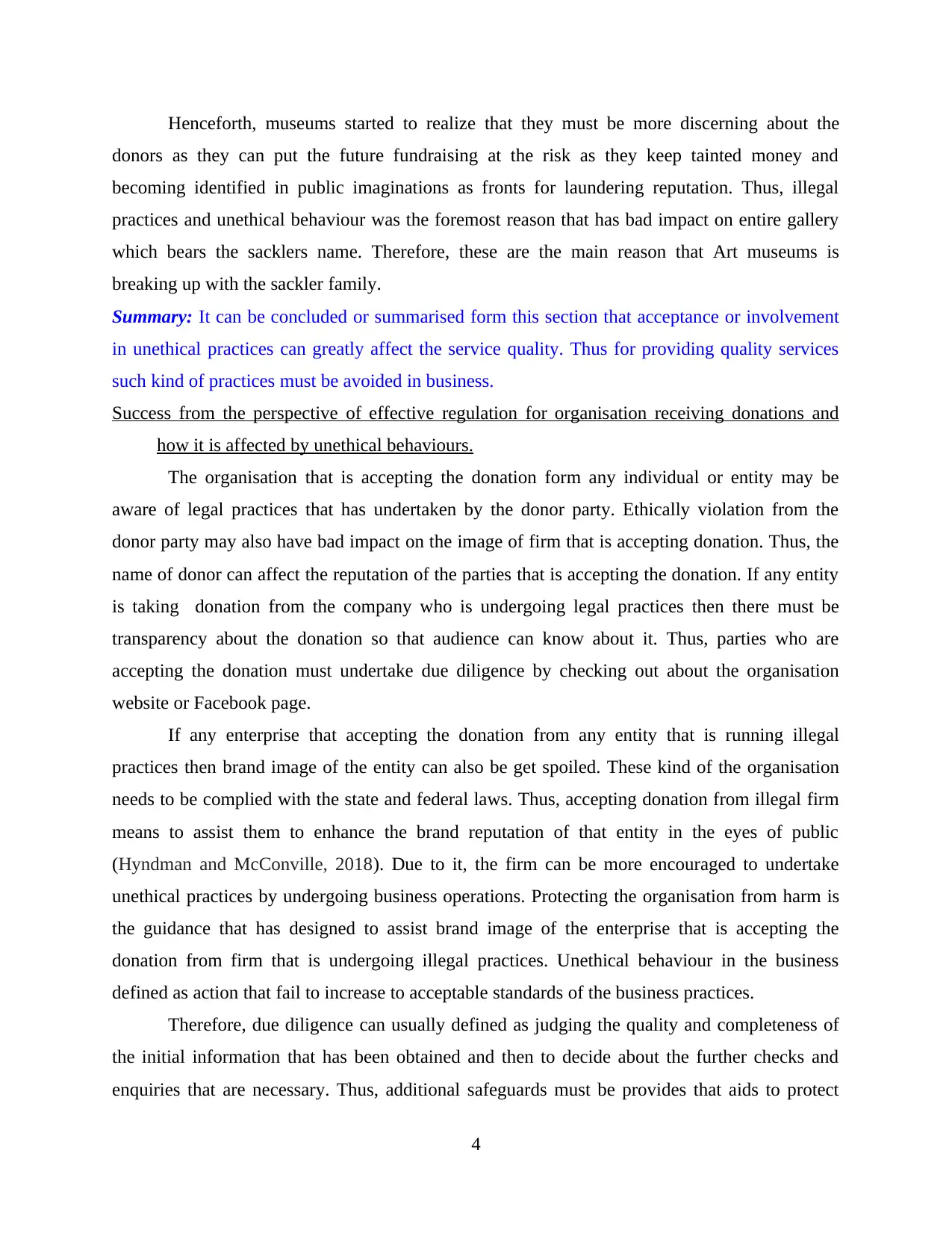
Henceforth, museums started to realize that they must be more discerning about the
donors as they can put the future fundraising at the risk as they keep tainted money and
becoming identified in public imaginations as fronts for laundering reputation. Thus, illegal
practices and unethical behaviour was the foremost reason that has bad impact on entire gallery
which bears the sacklers name. Therefore, these are the main reason that Art museums is
breaking up with the sackler family.
Summary: It can be concluded or summarised form this section that acceptance or involvement
in unethical practices can greatly affect the service quality. Thus for providing quality services
such kind of practices must be avoided in business.
Success from the perspective of effective regulation for organisation receiving donations and
how it is affected by unethical behaviours.
The organisation that is accepting the donation form any individual or entity may be
aware of legal practices that has undertaken by the donor party. Ethically violation from the
donor party may also have bad impact on the image of firm that is accepting donation. Thus, the
name of donor can affect the reputation of the parties that is accepting the donation. If any entity
is taking donation from the company who is undergoing legal practices then there must be
transparency about the donation so that audience can know about it. Thus, parties who are
accepting the donation must undertake due diligence by checking out about the organisation
website or Facebook page.
If any enterprise that accepting the donation from any entity that is running illegal
practices then brand image of the entity can also be get spoiled. These kind of the organisation
needs to be complied with the state and federal laws. Thus, accepting donation from illegal firm
means to assist them to enhance the brand reputation of that entity in the eyes of public
(Hyndman and McConville, 2018). Due to it, the firm can be more encouraged to undertake
unethical practices by undergoing business operations. Protecting the organisation from harm is
the guidance that has designed to assist brand image of the enterprise that is accepting the
donation from firm that is undergoing illegal practices. Unethical behaviour in the business
defined as action that fail to increase to acceptable standards of the business practices.
Therefore, due diligence can usually defined as judging the quality and completeness of
the initial information that has been obtained and then to decide about the further checks and
enquiries that are necessary. Thus, additional safeguards must be provides that aids to protect
4
donors as they can put the future fundraising at the risk as they keep tainted money and
becoming identified in public imaginations as fronts for laundering reputation. Thus, illegal
practices and unethical behaviour was the foremost reason that has bad impact on entire gallery
which bears the sacklers name. Therefore, these are the main reason that Art museums is
breaking up with the sackler family.
Summary: It can be concluded or summarised form this section that acceptance or involvement
in unethical practices can greatly affect the service quality. Thus for providing quality services
such kind of practices must be avoided in business.
Success from the perspective of effective regulation for organisation receiving donations and
how it is affected by unethical behaviours.
The organisation that is accepting the donation form any individual or entity may be
aware of legal practices that has undertaken by the donor party. Ethically violation from the
donor party may also have bad impact on the image of firm that is accepting donation. Thus, the
name of donor can affect the reputation of the parties that is accepting the donation. If any entity
is taking donation from the company who is undergoing legal practices then there must be
transparency about the donation so that audience can know about it. Thus, parties who are
accepting the donation must undertake due diligence by checking out about the organisation
website or Facebook page.
If any enterprise that accepting the donation from any entity that is running illegal
practices then brand image of the entity can also be get spoiled. These kind of the organisation
needs to be complied with the state and federal laws. Thus, accepting donation from illegal firm
means to assist them to enhance the brand reputation of that entity in the eyes of public
(Hyndman and McConville, 2018). Due to it, the firm can be more encouraged to undertake
unethical practices by undergoing business operations. Protecting the organisation from harm is
the guidance that has designed to assist brand image of the enterprise that is accepting the
donation from firm that is undergoing illegal practices. Unethical behaviour in the business
defined as action that fail to increase to acceptable standards of the business practices.
Therefore, due diligence can usually defined as judging the quality and completeness of
the initial information that has been obtained and then to decide about the further checks and
enquiries that are necessary. Thus, additional safeguards must be provides that aids to protect
4
Paraphrase This Document
Need a fresh take? Get an instant paraphrase of this document with our AI Paraphraser
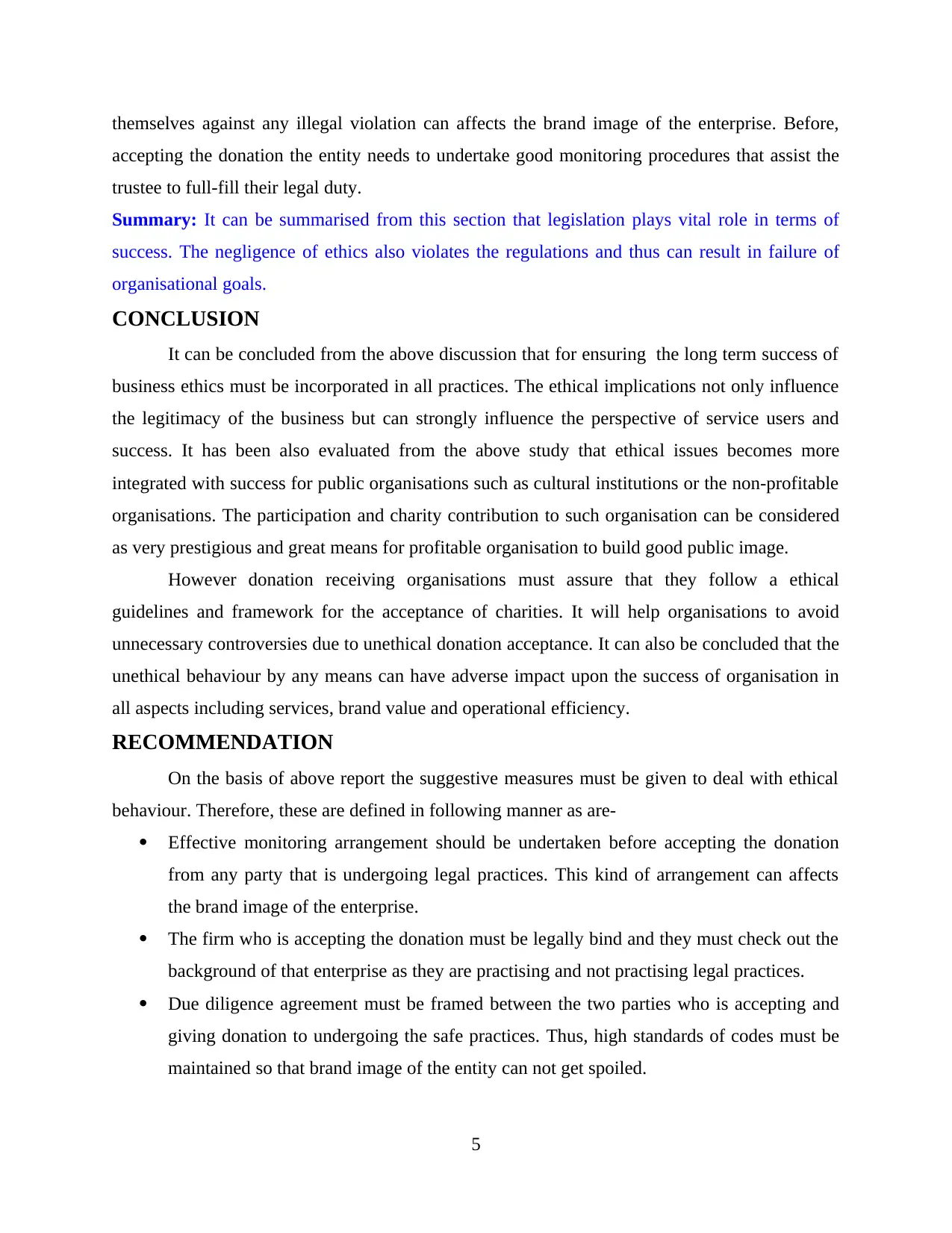
themselves against any illegal violation can affects the brand image of the enterprise. Before,
accepting the donation the entity needs to undertake good monitoring procedures that assist the
trustee to full-fill their legal duty.
Summary: It can be summarised from this section that legislation plays vital role in terms of
success. The negligence of ethics also violates the regulations and thus can result in failure of
organisational goals.
CONCLUSION
It can be concluded from the above discussion that for ensuring the long term success of
business ethics must be incorporated in all practices. The ethical implications not only influence
the legitimacy of the business but can strongly influence the perspective of service users and
success. It has been also evaluated from the above study that ethical issues becomes more
integrated with success for public organisations such as cultural institutions or the non-profitable
organisations. The participation and charity contribution to such organisation can be considered
as very prestigious and great means for profitable organisation to build good public image.
However donation receiving organisations must assure that they follow a ethical
guidelines and framework for the acceptance of charities. It will help organisations to avoid
unnecessary controversies due to unethical donation acceptance. It can also be concluded that the
unethical behaviour by any means can have adverse impact upon the success of organisation in
all aspects including services, brand value and operational efficiency.
RECOMMENDATION
On the basis of above report the suggestive measures must be given to deal with ethical
behaviour. Therefore, these are defined in following manner as are-
Effective monitoring arrangement should be undertaken before accepting the donation
from any party that is undergoing legal practices. This kind of arrangement can affects
the brand image of the enterprise.
The firm who is accepting the donation must be legally bind and they must check out the
background of that enterprise as they are practising and not practising legal practices.
Due diligence agreement must be framed between the two parties who is accepting and
giving donation to undergoing the safe practices. Thus, high standards of codes must be
maintained so that brand image of the entity can not get spoiled.
5
accepting the donation the entity needs to undertake good monitoring procedures that assist the
trustee to full-fill their legal duty.
Summary: It can be summarised from this section that legislation plays vital role in terms of
success. The negligence of ethics also violates the regulations and thus can result in failure of
organisational goals.
CONCLUSION
It can be concluded from the above discussion that for ensuring the long term success of
business ethics must be incorporated in all practices. The ethical implications not only influence
the legitimacy of the business but can strongly influence the perspective of service users and
success. It has been also evaluated from the above study that ethical issues becomes more
integrated with success for public organisations such as cultural institutions or the non-profitable
organisations. The participation and charity contribution to such organisation can be considered
as very prestigious and great means for profitable organisation to build good public image.
However donation receiving organisations must assure that they follow a ethical
guidelines and framework for the acceptance of charities. It will help organisations to avoid
unnecessary controversies due to unethical donation acceptance. It can also be concluded that the
unethical behaviour by any means can have adverse impact upon the success of organisation in
all aspects including services, brand value and operational efficiency.
RECOMMENDATION
On the basis of above report the suggestive measures must be given to deal with ethical
behaviour. Therefore, these are defined in following manner as are-
Effective monitoring arrangement should be undertaken before accepting the donation
from any party that is undergoing legal practices. This kind of arrangement can affects
the brand image of the enterprise.
The firm who is accepting the donation must be legally bind and they must check out the
background of that enterprise as they are practising and not practising legal practices.
Due diligence agreement must be framed between the two parties who is accepting and
giving donation to undergoing the safe practices. Thus, high standards of codes must be
maintained so that brand image of the entity can not get spoiled.
5
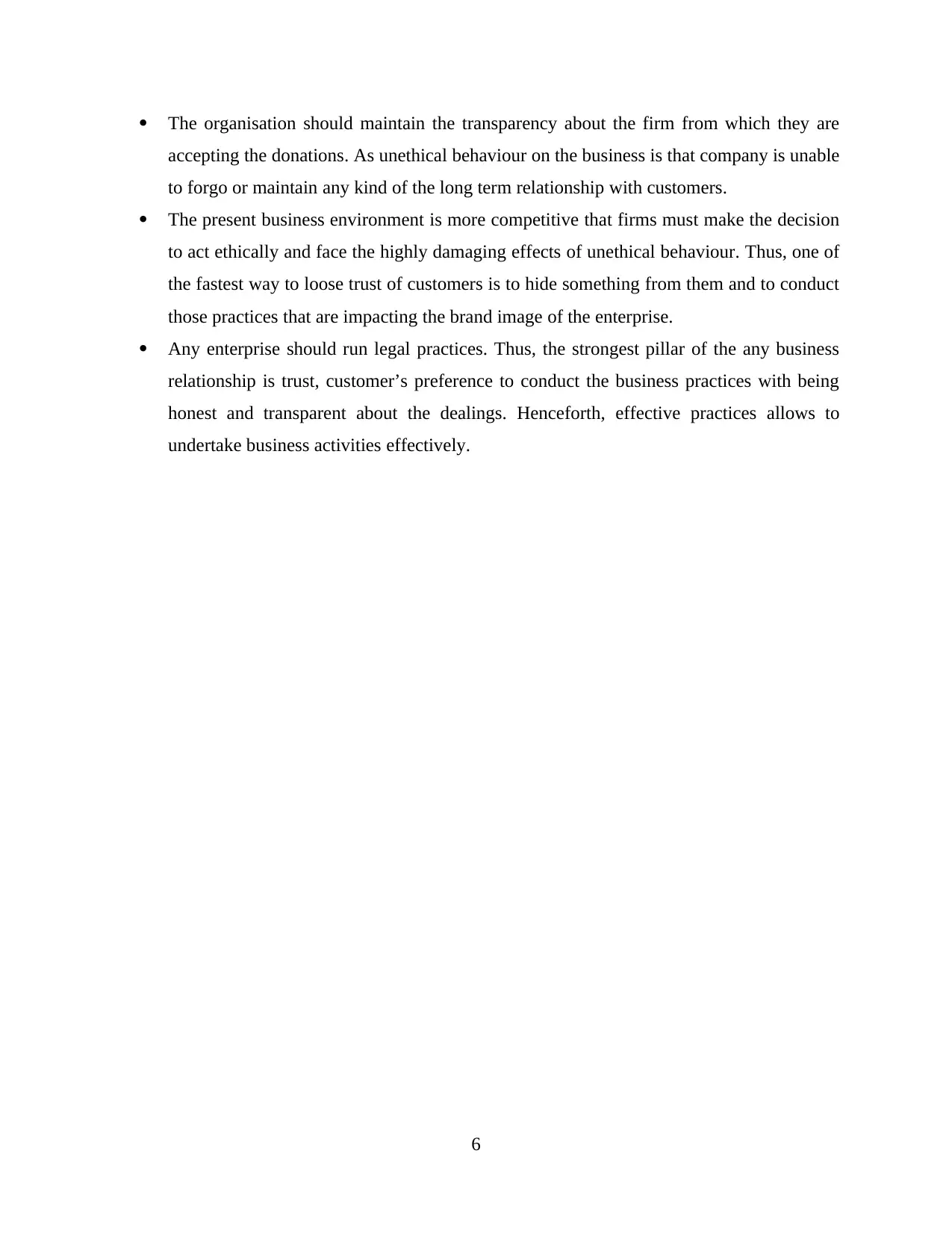
The organisation should maintain the transparency about the firm from which they are
accepting the donations. As unethical behaviour on the business is that company is unable
to forgo or maintain any kind of the long term relationship with customers.
The present business environment is more competitive that firms must make the decision
to act ethically and face the highly damaging effects of unethical behaviour. Thus, one of
the fastest way to loose trust of customers is to hide something from them and to conduct
those practices that are impacting the brand image of the enterprise.
Any enterprise should run legal practices. Thus, the strongest pillar of the any business
relationship is trust, customer’s preference to conduct the business practices with being
honest and transparent about the dealings. Henceforth, effective practices allows to
undertake business activities effectively.
6
accepting the donations. As unethical behaviour on the business is that company is unable
to forgo or maintain any kind of the long term relationship with customers.
The present business environment is more competitive that firms must make the decision
to act ethically and face the highly damaging effects of unethical behaviour. Thus, one of
the fastest way to loose trust of customers is to hide something from them and to conduct
those practices that are impacting the brand image of the enterprise.
Any enterprise should run legal practices. Thus, the strongest pillar of the any business
relationship is trust, customer’s preference to conduct the business practices with being
honest and transparent about the dealings. Henceforth, effective practices allows to
undertake business activities effectively.
6
⊘ This is a preview!⊘
Do you want full access?
Subscribe today to unlock all pages.

Trusted by 1+ million students worldwide
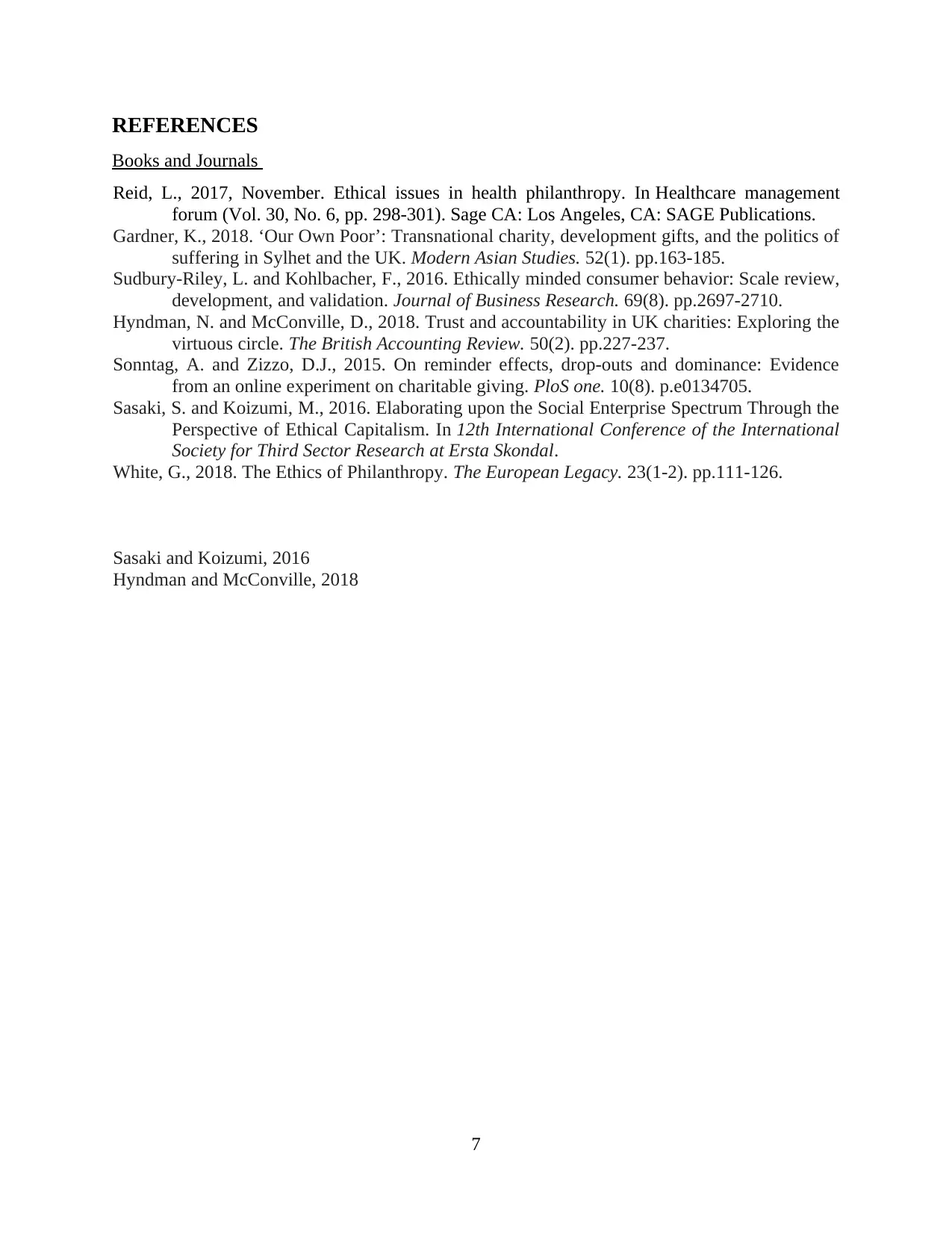
REFERENCES
Books and Journals
Reid, L., 2017, November. Ethical issues in health philanthropy. In Healthcare management
forum (Vol. 30, No. 6, pp. 298-301). Sage CA: Los Angeles, CA: SAGE Publications.
Gardner, K., 2018. ‘Our Own Poor’: Transnational charity, development gifts, and the politics of
suffering in Sylhet and the UK. Modern Asian Studies. 52(1). pp.163-185.
Sudbury-Riley, L. and Kohlbacher, F., 2016. Ethically minded consumer behavior: Scale review,
development, and validation. Journal of Business Research. 69(8). pp.2697-2710.
Hyndman, N. and McConville, D., 2018. Trust and accountability in UK charities: Exploring the
virtuous circle. The British Accounting Review. 50(2). pp.227-237.
Sonntag, A. and Zizzo, D.J., 2015. On reminder effects, drop-outs and dominance: Evidence
from an online experiment on charitable giving. PloS one. 10(8). p.e0134705.
Sasaki, S. and Koizumi, M., 2016. Elaborating upon the Social Enterprise Spectrum Through the
Perspective of Ethical Capitalism. In 12th International Conference of the International
Society for Third Sector Research at Ersta Skondal.
White, G., 2018. The Ethics of Philanthropy. The European Legacy. 23(1-2). pp.111-126.
Sasaki and Koizumi, 2016
Hyndman and McConville, 2018
7
Books and Journals
Reid, L., 2017, November. Ethical issues in health philanthropy. In Healthcare management
forum (Vol. 30, No. 6, pp. 298-301). Sage CA: Los Angeles, CA: SAGE Publications.
Gardner, K., 2018. ‘Our Own Poor’: Transnational charity, development gifts, and the politics of
suffering in Sylhet and the UK. Modern Asian Studies. 52(1). pp.163-185.
Sudbury-Riley, L. and Kohlbacher, F., 2016. Ethically minded consumer behavior: Scale review,
development, and validation. Journal of Business Research. 69(8). pp.2697-2710.
Hyndman, N. and McConville, D., 2018. Trust and accountability in UK charities: Exploring the
virtuous circle. The British Accounting Review. 50(2). pp.227-237.
Sonntag, A. and Zizzo, D.J., 2015. On reminder effects, drop-outs and dominance: Evidence
from an online experiment on charitable giving. PloS one. 10(8). p.e0134705.
Sasaki, S. and Koizumi, M., 2016. Elaborating upon the Social Enterprise Spectrum Through the
Perspective of Ethical Capitalism. In 12th International Conference of the International
Society for Third Sector Research at Ersta Skondal.
White, G., 2018. The Ethics of Philanthropy. The European Legacy. 23(1-2). pp.111-126.
Sasaki and Koizumi, 2016
Hyndman and McConville, 2018
7
Paraphrase This Document
Need a fresh take? Get an instant paraphrase of this document with our AI Paraphraser

8

9
⊘ This is a preview!⊘
Do you want full access?
Subscribe today to unlock all pages.

Trusted by 1+ million students worldwide
1 out of 14
Related Documents
Your All-in-One AI-Powered Toolkit for Academic Success.
+13062052269
info@desklib.com
Available 24*7 on WhatsApp / Email
![[object Object]](/_next/static/media/star-bottom.7253800d.svg)
Unlock your academic potential
Copyright © 2020–2026 A2Z Services. All Rights Reserved. Developed and managed by ZUCOL.





